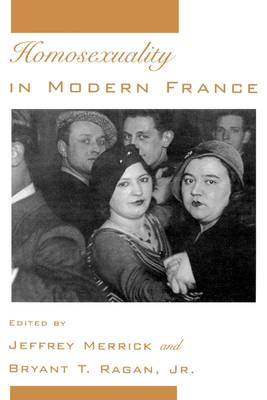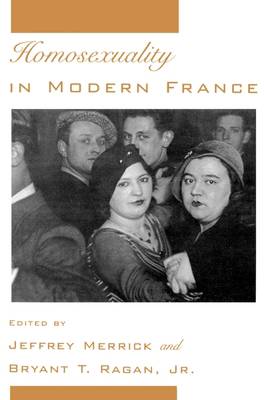
Bedankt voor het vertrouwen het afgelopen jaar! Om jou te bedanken bieden we GRATIS verzending (in België) aan op alles gedurende de hele maand januari.
- Afhalen na 1 uur in een winkel met voorraad
- Gratis thuislevering in België
- Ruim aanbod met 7 miljoen producten
Bedankt voor het vertrouwen het afgelopen jaar! Om jou te bedanken bieden we GRATIS verzending (in België) aan op alles gedurende de hele maand januari.
- Afhalen na 1 uur in een winkel met voorraad
- Gratis thuislevering in België
- Ruim aanbod met 7 miljoen producten
Zoeken
Homosexuality in Modern France
Jeffrey (Associate Professor of History, Associate Professor of, Bryant T. (Assistant Professor of History, Assistant Professor o
€ 56,45
+ 112 punten
Uitvoering
Omschrijving
This volume explores the realities and representations of same-sex sexuality in France in the eighteenth, nineteenth, and twentieth centuries, the period that witnessed the emergence of "homosexuality" in the modern sense of the word. Based on archival research and textual analysis, the articles examine the development of homosexual subcultures and illustrate the ways in which philosophes, pamphleteers, police, novelists, scientists, and politicians conceptualized same-sex relations and connected them with more general concerns about order and disorder. The contributors--Elizabeth Colwill, Michael David Sibalis, Victoria Thompson, William Peniston, Vernon Rosario II, Francesca Canade-Sautman, Martha Hanna, Robert A. Nye, and the editors Bryant T. Ragan, Jr. and Jeffrey Merrick--use the methods of intellectual and cultural history, the history of science, literary studies, legal and social history, and microhistory to outline the development and evolution of homosexual patterns of repression and liberation . This collection shows how the subject of homosexuality is related to important topics in French history: the Enlightenment, the revolutionary tradition, social discipline, positivism, elite and popular culture, nationalism, feminism, and the construction of identity. Given the role of gays and lesbians in modern French culture and the work of French scholars on the history of sexuality, this collection fills an important gap in the literature and represents the first attempt in any language to explore this subject over three centuries from a variety of perspectives.
Specificaties
Betrokkenen
- Auteur(s):
- Uitgeverij:
Inhoud
- Aantal bladzijden:
- 264
- Taal:
- Engels
- Reeks:
Eigenschappen
- Productcode (EAN):
- 9780195093049
- Verschijningsdatum:
- 15/08/1996
- Uitvoering:
- Paperback
- Formaat:
- Trade paperback (VS)
- Afmetingen:
- 156 mm x 235 mm
- Gewicht:
- 376 g

Alleen bij Standaard Boekhandel
+ 112 punten op je klantenkaart van Standaard Boekhandel
Beoordelingen
We publiceren alleen reviews die voldoen aan de voorwaarden voor reviews. Bekijk onze voorwaarden voor reviews.












